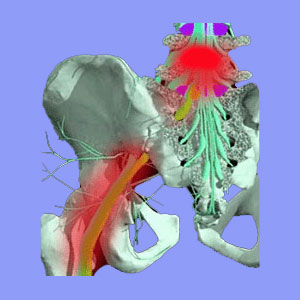
How long does sciatica last? This is a very common inquiry made by patients towards their doctors, as well as a frequent question that we receive here at The Sciatica Authority on a weekly basis. Unfortunately, there is little good news for us to share on this topic, since sciatica is well known to be a chronic and therapy-defiant health crisis.
The duration of sciatica can mean different things to different inquirers. Some patients want to know how long each attack might last or how much time they might enjoy without symptoms in between flare-ups. Other patients have persistent pain that never goes away and these people want to know if their sciatica will ever leave them in peace.
While there are no universally applicable answers to any of these questions, there is a tremendous amount of statistical evidence that we have compiled over our many years of patient advocacy work. Therefore, the scope of this dialog is to discuss the timeline of sciatica and how long patients might expect various manifestations to endure in their lives.
How Long Does Sciatica Last? / Acute Attacks
Acute attacks represent a very typical patient complaint, with symptoms coming and going from time to time. Some patients suffer frequent flare-ups of sciatica, while others only endure occasional bouts of misery. Here are the some of the facts we have collected about recurrent acute sciatica attacks:
In patients with a limited history of attacks (less than 5 years), episodes typically do not last too long. Most of these patients have occasional painful bouts of sciatica that might endure for a week or two, and then slowly get better so that the patient makes a full, or nearly full, recovery. These episodic attacks are often terribly fierce and can be debilitating in some instances. Since patients are not accustomed to the pain, they frequently become very frightened and stressed, often exacerbating the expressions exponentially.
These patterned attacks may or may not be linked to trigger factors, although most are definitely caused by certain physical or emotional instigators. However, these causations might not be immediately recognized by the patient or their care providers. Statistically, acute patterned flare-ups might occur between 2 to 6 times yearly, although there are patients with fewer and more attacks, as well.
When Will Chronic Sciatica Go Away?
Chronic sciatica describes conditions where symptoms exist all the time, or virtually all the time. The patient never gets any real semblance of full relief from their pain, although many victims do report significant changes in the severity of symptoms. Statistically, most chronic sciatica patients do not suffer this type of pain right from the commencement of their first attack. Instead, chronic pain conditions usually build over time, often replacing occasional acute attacks with never-ending pain.
The good news is that chronic pain sufferers often report their symptoms to be less severe when they reach the persistent stage. However, there remains great speculation that the symptoms are actually just as painful, but the patient has learned to better cope with the pain out of habit and necessity. Furthermore, the fear of the condition often diminishes over time, alleviating much of the collateral effects of previous unpredictable acute flare-ups.
Patients who do begin experiencing chronic versions of sciatica right from the start generally have significant injurious explanations for the symptoms. It is rare for a person to just suddenly develop chronic sciatica from nowhere and have the pain remain for an extended timeframe.
The bad news is that once a sciatica condition reaches a chronic state, it is one of the most difficult of all dorsalgia syndromes to resolve. Being that virtually all forms of back and neck pain can be stubborn and long-lasting, this is a horrifying truth. Treatment notwithstanding, including all forms of surgery, chronic sufferers will likely have some degree of pain for life, if their persistent symptoms endure for more than a year.
How Long Does Sciatica Last? / Summation
We see lots of patients who break the mold on these statistics, since individual cases vary tremendously. However, over the last 15 years of compiling research evidence, these patient citations have remained constant and do represent the vast majority of people who take part in our ongoing clinical statistic collection efforts.
Sciatica is not likely to go away easily, if at all. Sciatica does not respond well to most forms of treatment. Worse still, many cases of sciatica do not even enjoy the benefit of an accurate diagnosis to explain the causative origin of the symptoms. No wonder most patients become chronic and suffer for the long haul.
In the last year, I have personally broken some of the statistical standards of our own research. Having suffered with sciatica for decades already, in acute, then chronic forms, I was very accepting of the fact that my pain might be there until I die. However, my sciatica finally yielded to my latest attempts at treatment and I am now lucky to say that I am completely cured.





